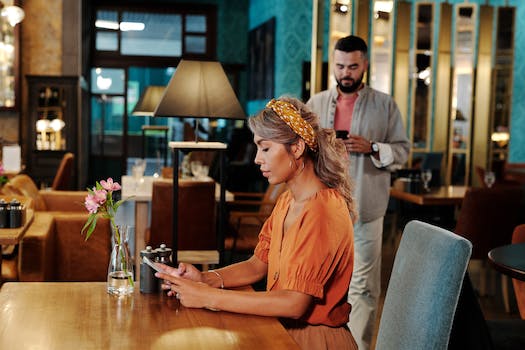Dating with Wisdom: Lessons from Those Who’ve Dated Their Age
The Benefits of Dating Someone Your Own Age
When it comes to dating, finding someone your own age can have a multitude of benefits. Firstly, there is a natural familiarity and understanding that comes with being in the same age bracket. You likely share similar life experiences, which can make conversations flow more effortlessly. From discussing childhood memories to navigating the ups and downs of adulthood, there is a comfort in knowing that your partner can relate to your journey.
Another advantage of dating someone your own age is the potential for shared values and interests. Whether it’s cultural references, hobbies, or even music preferences, having common ground can lead to a stronger connection. You can embark on new adventures together, attend events that genuinely interest both of you, and invest in activities that bring you joy as a couple. This shared foundation can not only deepen your bond, but also create a fulfilling and enriching relationship.
Navigating Compatibility and Shared Interests in Age-Appropriate Relationships
In age-appropriate relationships, navigating compatibility and shared interests is essential for building a strong connection. When two people are of a similar age, they are more likely to have grown up in the same era, experiencing similar cultural references and societal influences. This common ground can create a sense of camaraderie and understanding, making it easier to connect on a deeper level. Whether it’s shared hobbies, musical tastes, or leisure activities, finding common interests can enhance the bond between partners in age-appropriate relationships. These shared experiences can also serve as conversation starters and provide opportunities for spending quality time together, creating lasting memories and fostering a sense of togetherness.
Communication Skills: Key to Building a Meaningful Connection
Effective communication skills are vital for building a meaningful connection with your partner, regardless of age. When it comes to relationships, open and honest communication is the foundation that allows both individuals to express their needs, desires, and concerns. It is important to actively listen to your partner without judgment or interruption, providing them with a safe space to share their thoughts and emotions. By asking probing questions and seeking clarification, you can demonstrate your genuine interest and understanding. Additionally, being able to express yourself clearly and respectfully will help avoid misunderstandings and promote a deeper connection between you and your partner.
Another key aspect of communication skills in building a meaningful connection is non-verbal communication. Your body language, facial expressions, and tone of voice can convey more than words alone. Showing empathy and understanding through physical gestures such as holding hands or giving a comforting hug can help your partner feel loved and supported. Similarly, maintaining eye contact and using an affirmative tone can demonstrate attentiveness and sincerity. By being mindful of both your verbal and non-verbal communication, you can foster a stronger connection and strengthen your relationship.
• Actively listen to your partner without judgment or interruption
• Provide a safe space for them to share their thoughts and emotions
• Ask probing questions and seek clarification to show genuine interest and understanding
• Express yourself clearly and respectfully to avoid misunderstandings
• Use non-verbal communication such as body language, facial expressions, and tone of voice
• Show empathy and understanding through physical gestures like holding hands or giving hugs
• Maintain eye contact and use an affirmative tone to demonstrate attentiveness
and sincerity
Overcoming Age-Related Stereotypes in Dating
When it comes to dating, age should never be a barrier or a source of stereotypes. Overcoming age-related stereotypes in relationships is important to foster a healthy and genuine connection with your partner. One common stereotype is that older individuals may lack energy or enthusiasm in their relationships, while younger individuals might be seen as immature or inexperienced. However, it is crucial to remember that age does not define a person’s ability to love, be passionate, or be committed.
Another prevalent stereotype is the assumption that individuals of different generations cannot have shared interests or compatible lifestyles. It is important to challenge this notion and recognize that age does not necessarily dictate one’s interests or values. Just because someone is younger or older than you does not mean that you won’t find common ground or be able to have meaningful conversations. Building open and honest communication with your partner is key to understanding each other’s interests, values, and goals, regardless of age. It is through this understanding that you can break free from age-related stereotypes and create a relationship based on mutual understanding and respect.
Dealing with the Pressure of Societal Expectations in Age-Appropriate Relationships
Navigating age-appropriate relationships can sometimes come with its fair share of societal expectations and pressures. People around us, including friends, family, and even strangers, often have their own ideas about what is acceptable or appropriate when it comes to dating someone within our own age range. These societal expectations can leave us feeling self-conscious or judged, making it important to find healthy ways of dealing with this pressure.
One way to deal with societal expectations is by focusing on the authenticity of the relationship. Remind yourself that as long as the relationship is built on genuine love, trust, and respect, age should not be the determining factor.

Understanding and Respecting Boundaries in Age-Related Dating
When it comes to age-related dating, understanding and respecting boundaries is crucial. Each individual has their own limits and comfort levels, regardless of age. It is important to have open and honest conversations about boundaries early on in the relationship. This means discussing what is acceptable and what is not, what kind of physical affection is wanted or not wanted, and any other personal boundaries that need to be communicated. Taking the time to listen and understand each other’s boundaries helps to establish trust and create a safe space for both partners in the relationship.
Respecting boundaries means not pushing someone to do something they are not comfortable with, even if it may seem harmless or insignificant to you. It is essential to acknowledge and honor the boundaries set by your partner, as this demonstrates a genuine care and respect for their individuality. Remember, consent should always be a priority, regardless of age. It is important to be sensitive to each other’s feelings and needs, and to continuously communicate and check in with each other as the relationship progresses. By understanding and respecting boundaries, both partners can build a strong foundation of trust and mutual respect in their age-related dating journey.
Balancing Independence and Interdependence in Age-Appropriate Relationships
In age-appropriate relationships, finding a balance between independence and interdependence is crucial for a healthy and fulfilling connection. While it is important for both individuals to maintain their independence and sense of self, it is equally essential to foster a strong sense of interdependence, where partners rely on and support each other. This delicate balance allows for personal growth while creating a solid foundation for the relationship.
Maintaining independence means that each partner has their own interests, hobbies, and social circles outside of the relationship. It is important to embrace these individual pursuits, as they contribute to personal happiness and fulfillment. By encouraging each other to pursue their passions, both partners can maintain a sense of autonomy and prevent the relationship from becoming stifling or suffocating. At the same time, it is crucial to nourish the connection between partners by acknowledging and appreciating each other’s strengths and contributions. This interdependence fosters emotional support, open communication, and a sense of unity, allowing the relationship to thrive.
Managing Differences in Life Goals and Priorities in Dating
When it comes to dating someone with different life goals and priorities, it’s important to approach the situation with open-mindedness and understanding. While it may initially seem like a hurdle, this can actually be an opportunity for growth and self-discovery. Rather than viewing these differences as obstacles, see them as a chance to broaden your perspective and learn from one another. Remember, relationships are about compromise and finding common ground, so take the time to have open and honest conversations about your goals and priorities, and see if there are areas where you can align or support each other.
One key aspect of managing differences in life goals and priorities is maintaining clear and effective communication. This means not only expressing your own desires and aspirations but also actively listening to your partner’s needs and concerns. By creating a safe space for open dialogue, you can work together to find a balance that honors both of your goals. It’s important to remember that compromise doesn’t mean sacrificing your own dreams; rather, it involves finding creative solutions that allow both individuals to pursue their individual passions while still nurturing the relationship. Ultimately, managing differences in life goals and priorities requires patience, empathy, and a willingness to find common ground, even in the face of potential challenges.
Handling Challenges and Conflict Resolution in Age-Related Dating
Age-related dating can come with its fair share of challenges and conflicts. However, navigating these hurdles can lead to a stronger and more fulfilling relationship. One common challenge is the difference in life experiences and perspectives between partners. Each person may have different expectations and ways of approaching situations, which can sometimes lead to misunderstandings or disagreements. It is important to recognize and respect each other’s viewpoints, taking the time to communicate and find common ground. By actively listening to each other and being open to compromise, couples can overcome these challenges and find a resolution that works for both parties.
Another potential hurdle in age-related dating is managing the opinions and judgments of others.


The Importance of Self-Growth and Personal Development in Age-Appropriate Relationships
Self-growth and personal development are crucial aspects of any relationship, regardless of age. When two people are committed to their own growth, they are more likely to bring their best selves to the relationship and support each other’s individual journeys. In age-appropriate relationships, this becomes even more significant as both partners have lived through different life stages and experiences. By prioritizing self-growth, both individuals can continue to evolve and remain engaged with their own aspirations, while still nurturing the bond they share.
In age-appropriate relationships, personal development offers an opportunity for both partners to constantly learn from one another. Each individual brings a unique set of skills, knowledge, and perspectives that can enrich the other person’s life. By actively seeking personal growth, individuals in age-appropriate relationships can develop a deeper understanding and appreciation for the different stages of life they are in. This shared growth fosters an environment of mutual respect and admiration, allowing the relationship to thrive as both partners continue to evolve and support each other’s personal goals.
Why is self-growth and personal development important in age-appropriate relationships?
Self-growth and personal development are important in age-appropriate relationships because they allow individuals to continuously evolve and improve themselves. This leads to better communication, increased understanding, and a stronger connection with their partner.
How can self-growth positively impact a relationship?
Self-growth positively impacts a relationship by promoting self-awareness, emotional intelligence, and personal fulfillment. When individuals focus on their own growth, they become more capable of supporting and empathizing with their partner, leading to a healthier and more fulfilling relationship.
What are some ways to foster self-growth in a relationship?
Fostering self-growth in a relationship can be achieved through open communication, encouraging each other’s interests and passions, and supporting personal goals and aspirations. It’s also essential to provide space for individuality and personal development outside of the relationship.
Can personal development affect the dynamics of an age-appropriate relationship?
Yes, personal development can affect the dynamics of an age-appropriate relationship. As individuals grow and change, their priorities, goals, and outlook on life may shift. This can impact the relationship dynamics and require open communication and mutual understanding to navigate any changes.
How can personal growth help in overcoming challenges in an age-appropriate relationship?
Personal growth helps in overcoming challenges in an age-appropriate relationship by equipping individuals with improved problem-solving skills, emotional resilience, and empathy. It allows them to approach challenges with a growth mindset and find constructive solutions that benefit both partners.
Is self-growth a continuous process in a relationship?
Yes, self-growth is a continuous process in a relationship. It’s important for individuals to consistently work on themselves, learn from experiences, and adapt to new situations. Continuous self-growth contributes to the overall health and longevity of the relationship.
How can personal development contribute to personal happiness in a relationship?
Personal development contributes to personal happiness in a relationship by fostering self-confidence, self-fulfillment, and a sense of purpose. When individuals are happy and fulfilled within themselves, they bring more positivity and contentment into the relationship.
Can personal growth positively impact other areas of life outside of the relationship?
Absolutely! Personal growth positively impacts other areas of life outside of the relationship. As individuals grow and develop, they become more self-assured, resilient, and motivated. This allows them to excel in their careers, relationships with friends and family, and overall well-being.
Are there any challenges in pursuing personal growth while being in an age-appropriate relationship?
Pursuing personal growth while being in an age-appropriate relationship can sometimes present challenges. It’s important to strike a balance between personal development and the needs of the relationship. Open communication and mutual support are crucial in navigating these challenges together.
How can couples support each other’s personal growth in an age-appropriate relationship?
Couples can support each other’s personal growth in an age-appropriate relationship by actively listening, providing encouragement, and being open to new experiences and perspectives. They can also create a safe space for personal growth and offer constructive feedback when necessary.






